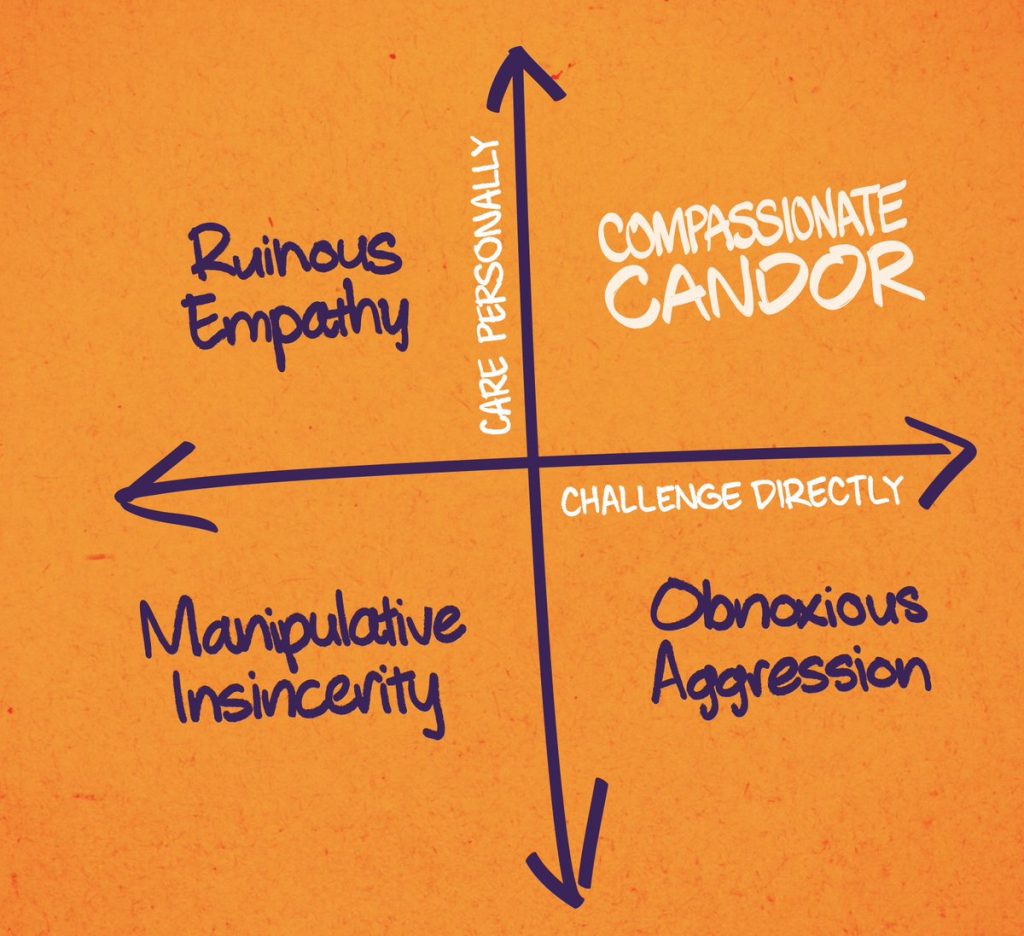Kim Scott is the author of Radical Candor: Be a Kick-Ass Boss Without Losing Your Humanity and Radical…
Practice Radical Candor to Combat These 3 Toxic Workplace Behaviors
A new survey from FlexJobs noted that 68% of people who recently quit their jobs did so without having another job lined up. What’s more, the number one reason people cited for resigning is toxic company culture. I left an organization six years ago without another job lined up for this very reason.
Similarly, a report from MIT Sloan Management Review stated, “A toxic corporate culture is 10.4 times more powerful than compensation in predicting a company’s attrition rate compared with its industry.”
Toxic company cultures aren’t just unpleasant, they can take a serious toll on your physical and mental health.
Jeffrey Pfeffer, a professor of organizational behavior at Stanford Graduate School of Business and author of Dying for a Paycheck: How Modern Management Harms Employee Health and Company Performance — and What We Can Do About It, reports that “In one survey, 61 % of employees said that workplace stress had made them sick and 7% said they had actually been hospitalized. Job stress costs U.S. employers more than $300 billion annually and may cause 120,000 excess deaths each year.”
By the time I decided to resign from my toxic job I had been battling — and working through — daily migraines for more than two months. The pain was so unbearable I was convinced I had a brain tumor.
After my MRI came back clear my doctor offered me some Radical Candor and told me that if I didn’t reduce my stress my health problems would most certainly get worse. All of my stress was coming from my 24/7 job. Not only had this job taken over my life, it was sabotaging my health in my 30s.
This is when I knew it was time to resign, and despite having no other job opportunities lined up I gave my notice.
Yes, being out of work with little to no savings was stressful. I had to buy a cheaper car, get a roommate and cobble together a network of freelance clients. My credit card debt piled up. But it was nowhere near as stressful as my toxic job, and shortly after I left the organization, my migraines subsided.
How could I have identified the traits of a toxic company culture before my health was at risk? Here are three behaviors to be aware of — obnoxious aggression, ruinous empathy and manipulative insincerity — when evaluating your company culture for toxic traits.
Obnoxious Aggression
Obnoxious Aggression, also called brutal honesty or front stabbing, is praise that doesn’t feel sincere or criticism and feedback that isn’t delivered kindly.
My first introduction to this kind of work behavior was when I went to the office with my mom when I was a child. She worked in finance and her boss was prone to fits of rage (based on the performance of the stock market) that would frighten me so much I often hid under her desk.
However, people who behave obnoxiously aggressively aren’t always yelling.
A boss who is behaving obnoxiously aggressively might call you into their office and calmly say, “I have some feedback for you. Your work is full of typos. What are you, stupid? Fix it and stop embarrassing the company.”
While you always know where you stand with a person who is behaving like this, you also spend a lot of time trying not to get caught in their crosshairs. That’s no way to live or work.
Ruinous Empathy
Ruinous Empathy is what happens when you want to spare someone’s short-term feelings, so you don’t tell them something they need to know.
It’s praise that isn’t specific enough to help the person understand what was good or criticism that is sugar-coated and unclear. Or simply silence. Ruinous Empathy may feel nice or safe, but is ultimately unhelpful and even damaging.
Ruinous Empathy is seeing somebody with their fly down, but, because you don’t want to embarrass them, you say nothing. The result is that 15 more people see them with their fly down, which is actually more embarrassing.
Often, ruinously empathetic behavior is disguised as a vague feedback sandwich. (We always discourage the use of the feedback sandwich as it’s confusing and insincere, and recommend the CORE model instead.)
For example, you might hear something like this: “The colors and fonts you chose for that presentation were so interesting and creative. But maybe next time you can choose a different font? But, where did you learn so much about fonts? I’m really impressed.”
When you get a sh*t sandwich as a form of feedback it’s almost impossible to know what to do more of and what to do less of to optimize your performance at work.
This kind of behavior often happens when people are trying to soften the blow when they need to deliver critical feedback. They are afraid of hurting your feelings so they try to put their criticism in between meaningless compliments.
In this kind of environment, by the time you’re aware something is going wrong, it’s usually too late to fix it. And while other people might be trying to be “nice,” they’re actually setting you up to fail. Not so nice after all.
Manipulative Insincerity
Manipulative Insincerity is praise that is insincere, flattery to a person’s face and harsh criticism behind their back.
It’s the kind of backstabbing, political, passive-aggressive behavior that might be fun to tell stories about but makes for a toxic workplace, ruining relationships and ruining work.
People give praise and criticism that is manipulatively insincere when they are too focused on being liked or they think they can gain some sort of political advantage by being fake, or when they are too tired to care or argue anymore.
To avoid engaging in manipulatively insincere behavior it’s important to facilitate clean escalation. Don’t let people talk about one another to you behind each other’s backs and don’t engage in office gossip.
Encourage people to talk directly and if they still can’t resolve the issue and you’re the manager, set up a three-way conversation.
With a supportive clean escalation meeting, you’ll help build trust between the two parties and show them how sharing criticism directly leads to a better outcome for everyone.
The Solution to a Toxic Company Culture is Radical Candor
Radical Candor — Caring Personally while Challenging Directly — is about giving a damn about the people you work with, sharing more than just your work self, and encouraging everyone who reports to you to do the same.
“It’s not enough to care only about people’s ability to perform a job. To build authentic relationships, you have to care about each of the people who work for you as a fellow human being,” Kim says.
This dimension of Radical Candor is called “Care Personally.”
In the book Radical Candor, Kim explains that practicing Radical Candor also involves telling people when their work isn’t good enough — and when it is; when they are not going to get that new role they wanted, or when you’re going to hire a new boss “over” them; when the results don’t justify further investment in what they’re working on.
This dimension is called “Challenge Directly.”
Radical Candor is what happens when you put “Care Personally” and “Challenge Directly” together. Radical Candor builds trust and opens the door for the kind of communication that helps you achieve the results you’re aiming for.
In short, Radical Candor is Compassionate Candor. It engages the heart (Care Personally) and the mind (Challenge Directly). What makes it radical is that it’s rare.
“It turns out that when people trust you and feel like you care about them, they are much more likely to accept and act on your praise and criticism; tell you what they really think about what you are doing well and, more importantly, not doing so well; engage in this same behavior with one another, which means less pushing the rock up the hill again and again; embrace their role on the team, and focus on getting results,” explains Kim.
The bottom is that you can make sure you’re not contributing to a toxic team or company culture by committing to always being kind, clear, specific and sincere.
And while you might not feel like you can change a toxic company culture single-handedly, if you’re in the market for a new job, you can avoid working for a toxic boss.
How to Avoid Working for a Toxic Boss
One of the first steps to avoiding a bad boss is knowing what you’re looking for in a boss.
Think about things like, how much autonomy you want in the job? Do you want a boss who’s going to be a mentor? Is this someone you could imagine going to with problems?
“First of all, trust your gut. That’s far more important than any list of criteria from me or anyone else. If you are not dying to work for this person, don’t take the job,” Radical Candor author and co-founder Kim Scott advises.
“If you’re not sure what you think of them, start by making a list of pros and cons. Keep wrestling with it until you get to what is for you the determinative factor. For me, it’s can this person help me take a step in the direction of my dreams, or will they trip me up?”
You want a boss who is respectful of the people who work for them, not a boss who tries to lord power over their employees or who thinks the job is a value judgment rather than a responsibility they’ll be held accountable for. Ask your potential new boss:
- What is your management philosophy?
- A lot of bosses won’t be able to articulate exactly what a boss does. “It took me a long time to do it when I was writing Radical Candor — bosses get feedback from and give feedback to teams to achieve results,” Kim says. “But you want them to have some idea of what their responsibilities as a boss are.”
- Dig into the details here. If someone says something that sounds buzzwordy or that you’re not sure what it means, ask them for a specific example of what they mean.
- Beware of absentee and micromanaging philosophies.
- You want a boss who solicits feedback and then responds well to it — who has a growth mindset.
- Ask your prospective boss about a failure. Who told them they were failing, and what did they learn from the experience? If they tell you about a time when one of their employees told them they were screwing up and they responded well, that’s a really good sign
- Ask your prospective boss how they like to receive feedback. (Your real question is, will you take feedback if I give it to you.)
- Try giving your prospective boss feedback about something you observed during the interview process, and notice how they respond.
Once you have an offer and know who your boss is going to be, talk to other people who have worked for them. You better believe that your new employer is doing backdoor reference checks on you.
Do some backdoor reference checks on your boss. If people were miserable working for that person, don’t take the job. You’ll soon be miserable too. Remember, you don’t have to pay the as*shole tax.
“It’s true that your boss’s boss can have a huge impact on how your boss behaves. But I’ve worked for some people who are incredible shit umbrellas — who shielded me from toxicity they were experiencing,” Kim says. “Others, however, are like shit funnels… If you are worried about the broader culture, make sure you’re working for a shit umbrella and not a shit funnel.”
————————————————————————————————————————————————————————————–
Download our free learning guides to start putting Radical Candor into practice.
Sign up for our Radical Candor email newsletter >>
Shop the Radial Candor store >>
Book a keynote or workshop >>
Need help practicing Radical Candor? Then you need The Feedback Loop (think Groundhog Day meets The Office), a 5-episode workplace comedy series starring David Alan Grier that brings to life Radical Candor’s simple framework for navigating candid conversations.
You’ll get an hour of hilarious content about a team whose feedback fails are costing them business; improv-inspired exercises to teach everyone the skills they need to work better together, and after-episode action plans you can put into practice immediately to up your helpful feedback EQ.
We’re offering Radical Candor readers 10% off the self-paced e-course. Follow this link and enter the promo code FEEDBACK at checkout.









